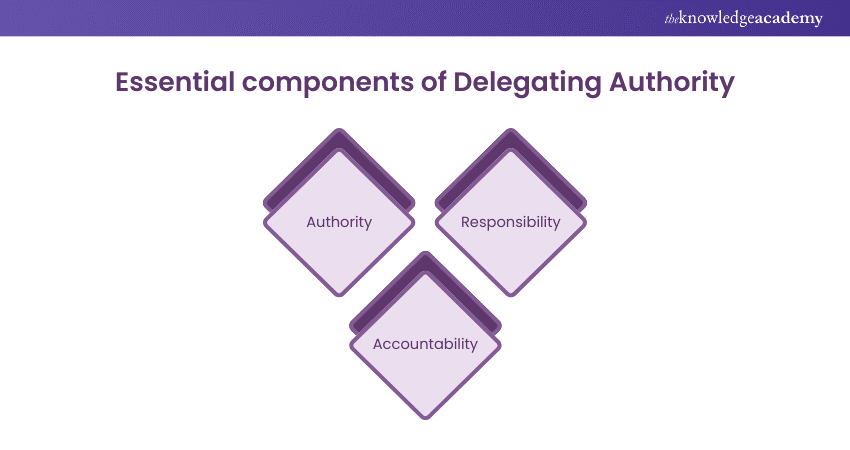We may not have the course you’re looking for. If you enquire or give us a call on 01344203999 and speak to our training experts, we may still be able to help with your training requirements.
Training Outcomes Within Your Budget!
We ensure quality, budget-alignment, and timely delivery by our expert instructors.

Delegation of Authority, which involves proper distribution of power, is the crux of efficient management hence the main pillar of organisational success. This blog specifically focuses on this aspect in depth, providing its explanation, meaning and possible practical ways of application.
Through Delegation, leaders can empower themselves, by distributing tasks, fostering employee advancement, and paying more attention on strategic planning. By identifying its fundamental parts and using tried and true management approaches, organisations can achieve productivity growth, build operational efficiency and easily adapt in a changing environment. Let us dive right into the strategies of Delegation and witness how this tremendously improves efficiency while at the same time elevates teamwork within today's ever-evolving economy.
Table of Contents
1) What is Delegation of Authority?
2) Importance of Delegation
3) Essential components of Delegating Authority
4) Features of Delegation of Authority
5) Steps to effective Delegation in management
6) Conclusion
What is Delegation of Authority?
The concept of Delegation, which entails the transfer of accountability and decision-making powers from one person to another or from one level of Authority to another within a business, plays a vital role in management. It entails the Delegation of responsibility and other activities to subordinates under your supervision with you holding ultimate responsibility for the outcomes. This helps the leaders allocate work, motivate everyone, and be efficient by exploiting everyone’s potential. Delegation, in addition to contributing to the development and independence of employees, also permits the leaders to deal with matters that are strategic and of high importance, thereby increasing the organisational efficiency and enabling the realisation of the set objectives.
Importance of Delegation
In management, Delegation is one of the essential points because it acts as the basic element upon which the organisational effectiveness and efficiency depends.
a) Workload distribution: Delegation enables leaders to distribute tasks evenly among team members based on their skills, expertise, and availability. By assigning responsibilities appropriately, managers prevent burnout, promote work-life balance, and ensure that no single individual is overwhelmed with tasks.
b) Employee empowerment: Delegation fosters a sense of empowerment among employees by granting them the Authority and autonomy to make decisions and take ownership of their work. This not only boosts morale but also encourages innovation, creativity, and problem-solving skills.
c) Skill development: Delegating tasks provides valuable opportunities for employees to enhance their skills, gain experience, and expand their knowledge base. Through hands-on involvement in diverse assignments, team members can develop new competencies, grow professionally, and advance their careers within the organisation.
d) Time management: Effective Delegation allows managers to prioritise their time and focus on strategic initiatives, leadership responsibilities, and high-impact tasks that require their expertise. By entrusting routine or less critical activities to capable team members, leaders can allocate their time more efficiently and drive organisational growth.
e) Flexibility and adaptability: In today's fast-paced and dynamic business environment, Delegation enhances organisational flexibility and adaptability. By empowering individuals at all levels to make decisions and take actions, organisations can respond quickly to changes, seise opportunities, and address challenges in a timely manner.
f) Leadership development: Delegation is a cornerstone of leadership development, as it encourages individuals to step into leadership roles, exercise sound judgment, and take accountability for their actions. By delegating Authority, managers nurture future leaders, groom successors, and cultivate a culture of leadership throughout the organisation.
g) Team collaboration and cohesion: Delegation promotes teamwork, collaboration, and synergy within teams by encouraging open communication, sharing of ideas, and mutual support. When individuals feel trusted and valued, they are more likely to collaborate effectively, leverage each other's strengths, and achieve collective goals.
h) Organisational growth and success: Ultimately, effective Delegation contributes to organisational growth and success by optimising resource utilisation, maximising productivity, and driving innovation. By leveraging the collective talents and capabilities of their teams, leaders can propel the organisation forward, achieve strategic objectives, and sustain long-term success in a competitive marketplace.
Improve your Leadership Skills through our Leadership Skills Course!
Essential components of Delegating Authority
The essential elements of Delegation include such fundamental attributes that enable the organisation to perform the responsibilities effectively. Here's a detailed exploration:

Authority
Authority is a term which denotes the power or rights to someone who can decide, give commands and take actions within a defined area. It implies emboldening the employees to execute delegated tasks wisely. Well-defined Authority lines of superiors and subordinates help individuals to identify decision-making limits and make informed choices within them.
Responsibility
Responsibility requires one to exercise the duty of doing what one is assigned or expected to do for a desired outcome. It is important for people to know what they are commissioned for and get it done once they are delegated their tasks. This requires spelling out objectivity, team members’ assignments and deadlines respectively. It will be effective to select people for tasks by considering their skills, aptitude, and availability, making sure that responsibilities are aligned with competencies.
Accountability
Accountability means that the one who delegates the tasks need to be responsible, including in both success and failure situations. Although employees are empowered to make decisions, conduct operations and take actions within their defined boundaries, they are responsible too for the results of their actions. This accountability leads to the culture of ownership, and people end up accepting responsibility, taking pleasure in what they do and seek excellence. It is significant for the delegated tasks to have transparent communication channels that clearly state the performance expectations and evaluation criteria for accountability.
Improve your decision making through our Decision Making Skills Training Course.
Features of Delegation of Authority
The features of Delegation of Authority encapsulate the defining characteristics that distinguish this management practice and facilitate its effective implementation within organisations:
a) Clear delineation of responsibilities: Assigning tasks and decision-making powers is one from the principles of Delegation. With this clear profile people will know what exactly their functions are, what is their Authority and what is their scope of the responsibility which will reduce the confusion and ambiguity.
b) Establishment of Authority levels: Putting across assignment implies setting specific authorisations levels by using positions, expertise and organisational hierarchy. Such separating structure serves to identify the person who holds the right to decide on the issue, to act, and to perform the tasks given to them, guaranteeing the efficient decision-making and execution thereof.
c) Provision of necessary resources and support: Successful Delegation implies that people should be given the resources, tools, information and support needed to complete successfully their given duties. They may aid through technology, training, mentorship, as well as guidance by supervisors or colleagues.
d) Ongoing monitoring and evaluation: Delegation implies ongoing assessment and control of tasks delegated to follow up on the progress, difficulties, and any feedback to the delegate if necessary. Consistent performance check-ups and appraisals create a reassurance that the assigned tasks are being completed rightly by the people empowered and are aligned to organisational goals.
e) Flexibility and adaptability: Delegation makes organisations more flexible and adaptable by allowing anonymous individuals to step in and make decision and take actions according to the changing circumstances or emergencies. Such flexibility allows organisations to seise every possible opportunity and dodge every threat.
f) Promotion of accountability: Delegation cultivates an environment which puts pressure on people to take tasks that were allocated to them and be accountable for their results. By defining the expectations, making the communication transparent and using performance metrics, we can be sure that the accountability of the delegated roles is ensured.
g) Encouragement of collaboration and teamwork: Delegation includes cooperation and teamwork in organisations’ sets of skills and knowledge of its members. Effective Delegation develops a culture of open communication, encourages dissemination of knowledge, and representation of collaborative objectives.
h) Empowerment of employees: Delegation instils independence in personnel by equipping them with the power and space to take individual decisions and perform action within their delegated duties. This creates a win-win situation not only increases job satisfaction and morale, but also promotes a sense of ownership and motivation to organisational success.
Steps to effective Delegation in management
Effective Delegation in management involves a systematic approach to assigning tasks, empowering employees, and ensuring accountability for outcomes. Here are the steps to achieve successful Delegation:

Strategise and ready yourself
Begin with assessing the tasks and identifying the ones that can be delegated. Consider aspects that include difficulty, urgency, and attributes of team members. Prepare the task descriptions, objectives, and the deadlines for the tasks that you will delegate. Make sure that you make the expectations clear for the delegate.
Open dialogue on delegated tasks
As you delegate tasks to the individuals, communicate with them. Concisely define the goals, actions, and decision-making powers stemming from the Delegation of duties. Be open to questions. Make available the necessary materials and help where needed to ensure comprehension and agreement.
Set clear deadlines for completion
Declare deadlines for completing delegated activities according to their level of importance and urgency. The deadlines help keep procrastination at bay and facilitate the completion of tasks on time. Set deadlines concretely and aid where necessary to comply with them.
Define Authority levels clearly
Mark the boundaries of the scope of Authority allowed to individuals in connection with their activities to be performed under the Delegation. Define clearly their scope of responsibility, limit their Authority by the restrictions or boundaries which are imposed. It eliminates the confusions and makes sure that the takeaways of the decision are in line with the objectives of the business.
Incorporate checkpoints for progress tracking
Have checkpoints or shortcuts to track the progress of task Delegation. Often, assess and track the efficiency based on agreed milestones and dates. This helps you to highlight issues and challenges as early as possible and offer support or guidance so that deadlines are not missed or pushed further.
Conclude with a comprehensive debriefing
Upon successful implementing of the given tasks, conduct a retrospective session to clarify results, give feedback, and find lessons. Recognise accomplishments and rooms for improvement, as well as welcome open conversations to support future tasks. Through this debriefing, the team will grow with constant learning and self-improvement.
Conclusion
Delegation of Authority becomes a fundamental aspect of successful management since it creates an operation efficiency, boosts employee motivation and satisfaction and guarantees the long life of the enterprise. The effective leaders do this through comprehension of basic components and following the proven steps. In this way, leaders can unleash the full potential of their teams, achieving productivity and building accountability and a culture of collaboration. Authority Delegation acts as a transformer of the organisation impelling the teams to prosperity while sustaining high performance in an ever-changing environment.
Improve your leadership presence through our Executive Leadership Presence Training Course.
Frequently Asked Questions

When a manager delegates the responsibility of making purchasing decisions within a specified budget to a team member in the procurement department.

Clarity: Clearly communicate tasks, responsibilities, and expectations to the delegate.
Authority: Delegate appropriate Authority to the delegate to carry out the assigned tasks effectively.
Accountability: Hold the delegate accountable for the outcomes of the delegated tasks while providing support and guidance as needed.

The Knowledge Academy takes global learning to new heights, offering over 30,000 online courses across 490+ locations in 220 countries. This expansive reach ensures accessibility and convenience for learners worldwide.
Alongside our diverse Online Course Catalogue, encompassing 17 major categories, we go the extra mile by providing a plethora of free educational Online Resources like News updates, Blogs, videos, webinars, and interview questions. Tailoring learning experiences further, professionals can maximise value with customisable Course Bundles of TKA.

The Knowledge Academy’s Knowledge Pass, a prepaid voucher, adds another layer of flexibility, allowing course bookings over a 12-month period. Join us on a journey where education knows no bounds.

The Knowledge Academy offers various Leadership Courses, including Leadership Skills Course, Introduction to Supervising a Team Course and Managing Innovation Course. These courses cater to different skill levels, providing comprehensive insights into How to Develop a Strong Leadership Pipeline?
Our Business Skills Blogs covers a range of topics offering valuable resources, best practices, and industry insights. Whether you are a beginner or looking to advance your Business Improvement skills, The Knowledge Academy's diverse courses and informative blogs have you covered.
Upcoming Business Skills Resources Batches & Dates
Date
 Leadership Skills Training
Leadership Skills Training
Fri 31st May 2024
Fri 28th Jun 2024
Fri 26th Jul 2024
Fri 30th Aug 2024
Fri 27th Sep 2024
Fri 25th Oct 2024
Fri 29th Nov 2024
Fri 27th Dec 2024







 Top Rated Course
Top Rated Course



 If you wish to make any changes to your course, please
If you wish to make any changes to your course, please


